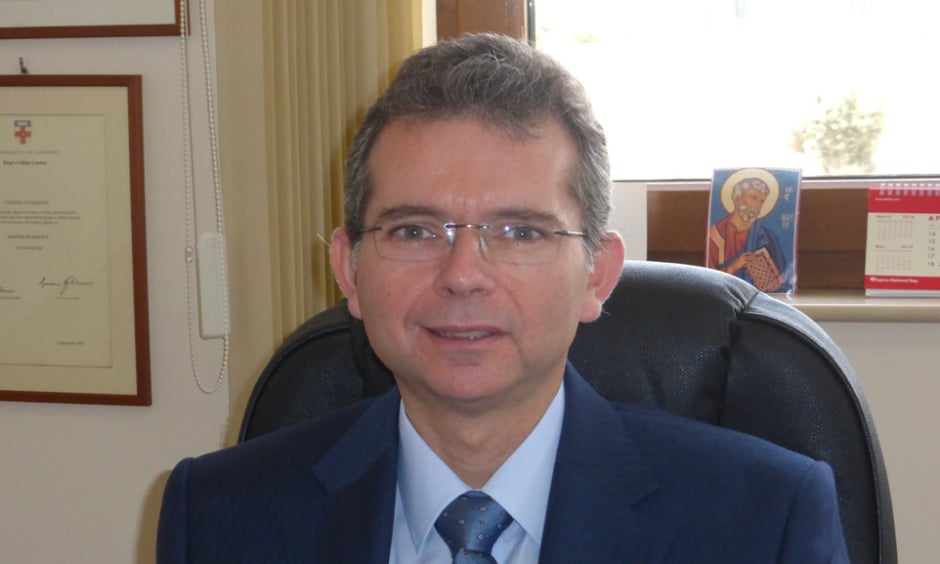Written by Dr Christakis Christodoulou | BMedSci, BMBS, FRCP (London), MSc, CCT
Clinical Assistant Professor, University of Nicosia Medical School, Cyprus
Consultant in Rheumatology and General (Internal) Medicine, Synesio Medical Centre, Larnaca, Cyprus
![]()
In March 2020, the COVID-19 pandemic arrived in Cyprus. Suddenly, our lives and our way of life has been affected in an unprecedented way. Under governmental guidelines, we all must stay at home and complete documentation or receive text message confirmation in order to be able to go to work, visit the doctor or pharmacy, or go to the supermarket. Many people are off work entirely, whilst others work from home. All schools and universities are closed, although some institutions are delivering teaching online. Many businesses, e.g. hotels, restaurants, coffee shops, and hairdressers, are closed. The airports are close to following suite, with only a very small number of flights being allowed in or out for specific purposes, e.g. for students to return home or for citizens of other countries to return to their home countries. Churches are closed to the public for the first time in our lifetime: only priests and their assistants can attend and conduct services in the period closer to Easter. The public can only watch the church service from the TV. As of 29th March 2020, there were 214 confirmed cases of COVID-19 infection in Cyprus and 6 deaths.
Rheumatology in Cyprus has been affected like any other medical specialty. Many of our patients are immunocompromised as a result of their treatment (synthetic, targeted synthetic and biological disease-modifying anti-rheumatic drugs, glucocorticoids etc.) or sometimes due to their disease (e.g. patients with systemic lupus erythematosus and leucopenia, neutropenia, or lymphopenia). Many of these patients are scared to visit outpatient clinics despite having severe symptoms from their underlying rheumatic disease. Many of our patients ask us if they should stop their treatment because they are scared what will happen if they develop COVID-19. Our advice is that they should continue their treatment unless they develop symptoms which could be caused by an infection. Also, many patients are scared to receive their intravenous biological disease-modifying anti-rheumatic drugs in the same public hospitals that admit COVID-19 cases, and instead opt to have them administered in the private hospitals during this difficult period. As such, we have seen reduced numbers of patients in outpatient clinics. We try to treat the more urgent cases and patients that are most in need. We offer a lot of telephone advice and guidance. Moreover, we screen patients on the phone before their appointment and we explain that family members that have flu-like symptoms should not attend for consultation. Also, patients with these symptoms that phone us before their appointment are advised not to attend. The guidance is that they should contact their general practitioner or telephone the emergency services if the problem is severe. During consultations we use face masks and gloves, as well as wash our hands very thoroughly.
Many patients that attend their appointments have a lot of fear in their eyes. Moreover, because our patients sit at home all day and they listen to the news, of which headlines are almost always bad (e.g., how many people have been affected globally, how many deaths each country has had), they develop anxiety, depression, and panic attacks. This is the first time in our careers that we have experienced something like this. Many patients wait in their cars until the patient before them has finished their consultation. The patients are only allowed to wait in the reception area one at a time. In many clinics their details are registered, and temperature taken before they are even permitted to do this.
All the doctors and nurses in Cyprus are currently under service of the government and can be called at any time to serve at the hospitals that treat patients with the COVID-19 infection. Rheumatologists obviously should stay away because of their continuous interaction with immunosuppressed patients. Since a large number of doctors and nurses to have treated patients globally with COVID-19 infection have since contracted the virus themselves, including some that have died, rheumatologists should do their utmost to stay healthy and focus on the treatment and safety of their immunocompromised patients.
Our hopes are that effective treatments will become available soon to treat the virus, as well as a vaccine for immunisation. Many agents are under current investigation, e.g., azithromycin, chloroquine, hydroxychloroquine, mefloquine, favilavir. It would be great if these agents prove effective in randomised controlled clinical trials, which need to be conducted immediately. We are short of time. Moreover, it is vital that the spread of the virus is contained so that the medical services and intensive treatment units can suffice for those that need them.
It is unbelievable that a virus has paralysed not only most of the healthcare sector and economy of Cyprus, but also healthcare sectors and the economies globally. Let’s hope that the pandemic can be controlled soon and that our lives can return to normality. The hot weather that we have in Cyprus over the summer might help. I hope that we will remember this difficult period as something that affected our way of life in a big way, but also make us better appreciate the important things in our lives, i.e., the value of health, the importance of family, and our understanding of the true meaning and purpose of life.








